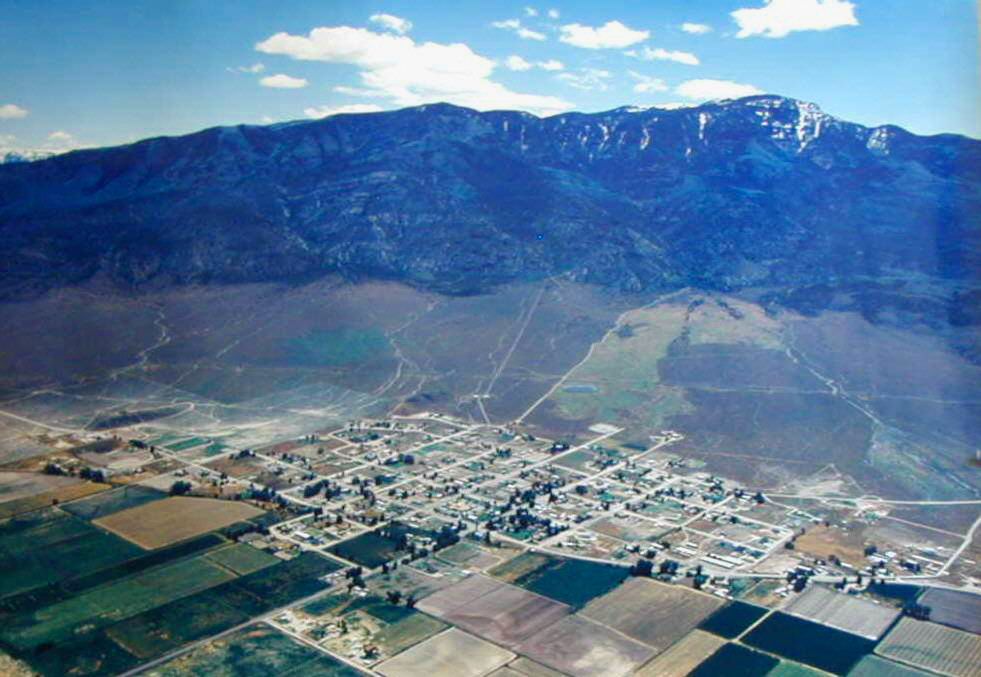The Mountain is a Man is a poem my Grandpa, Phil Daniels, wrote while on tour with the Air Force far from home. In his own words, “The poem began to form in my mind while I was laying in bed, early morning. I got up and wrote it out just as it is, and that was it. I think at the time I was probably homesick to see the mountains of Annabella.” Phil grew up a farmboy in that small town of Annabella, Utah, nestled at the foot of Cove Mountain. And what was clear to me and anyone that knew him, was that Grandpa had a fantastic love of place. The Mountain is a Man is a testament to Phil’s love of the piney face of Cove Moutain and a testament to the Wild’s power to shape us throughout our lives. Grandpa passed away in the spring 2018. Here, published post-humously, is The Mountain is a Man.
I asked myself not long ago,
“What makes me love that mountain so?”
I then began to think it over.
The reasons came–one, then another:
It has a face of great blue stone!
It has no skeleton of bone
It’s nose, it doesn’t have a bridge;
it does, however, have a ridge.
Behind the face there is a head.
“The mountain is a man,” I said.
“Reared and nurtured from its birth,
its mother is old Mother Earth.
His great hulk grew into the sky
sometime in ages long gone by.
There he stood when I was born
and there he’ll be when I am gone.
I love to look upon his face-
the handsomest of all his race.
Timpanogos and her kind
are not so difficult to find.
And what is more, they don’t impress
me with their bareness.
There’s just this one-he’s my first love.
His majestic peaks rise high above
my hometown lying at his feet
he watches over that retreat.
I’ve hunted in his piney beard
the mighty buck which he has reared;
I’ve camped out days upon his back
I’ve felled his timber tall and black;
I’ve hiked his ridges in my youth
I got from him what he had of truth;
I’ve ridden horseback over his face
I’ve seen the view from that high place.
I’m thankful that my childhood days
were spent in living beneath his gaze.
I’ve seen the sun upon him shine
in morning clear and peace sublime.
I’ve seen the fog obscure the view,
I’ve seen this man in moonlight too.
When in the valley far below
we saw our feeble lights aglow,
the rising moon, that yellow boulder
rising from behind the shoulder
of this man I here describe,
it casts a light both far and wide.
Upon his face the beams descend
a million shadows softly mend
the furrowed brow and rugged cheek;
they hide the crag and jutting peak.
At this hour, this mountain great
rests in his most gentle state.
Mystic blue, calm and serene;
more moving sights are seldom seen.
In winter time this moonlight sight
illumes the valley with it’s light
reflected from the snowy flake
frosted there like a giant cake
this mountain lies in winter’s spell
as clear as the cathedral bell.
When the winter wind did blow
I’ve seen around his brow the snow
swirl like a mist against the blue.
And in the summer, rain storms too
attacked this man of dirt and stone
then from his lap came gushing down
the floods of rock and driftwood great
our farms below to annihilate.
Of death he probably has no fears;
he’ll live, perhaps, ten million years
and when he dies, he’ll simply change
wear down like any mountain range.
Though one might question my intent
for holding such a sentiment
about a mountain dead and dumb
these lines explain from where it’s come,
and should explain my insight grand
why to me, that mountain is a man.
